#audible
Text
Kickstarting a book to end enshittification, because Amazon will not carry it

My next book is The Internet Con: How to Seize the Means of Computation: it’s a Big Tech disassembly manual that explains how to disenshittify the web and bring back the old good internet. The hardcover comes from Verso on Sept 5, but the audiobook comes from me — because Amazon refuses to sell my audio:
https://www.kickstarter.com/projects/doctorow/the-internet-con-how-to-seize-the-means-of-computation
Amazon owns Audible, the monopoly audiobook platform that controls >90% of the audio market. They require mandatory DRM for every book sold, locking those books forever to Amazon’s monopoly platform. If you break up with Amazon, you have to throw away your entire audiobook library.
That’s a hell of a lot of leverage to hand to any company, let alone a rapacious monopoly that ran a program targeting small publishers called “Project Gazelle,” where execs were ordered to attack indie publishers “the way a cheetah would pursue a sickly gazelle”:
https://www.businessinsider.com/sadistic-amazon-treated-book-sellers-the-way-a-cheetah-would-pursue-a-sickly-gazelle-2013-10
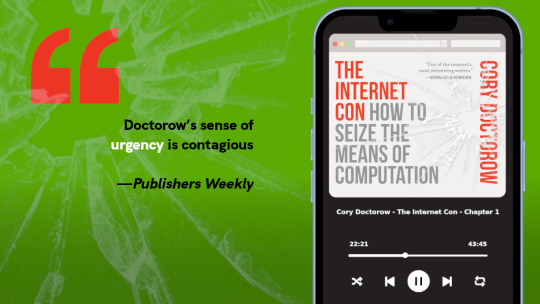
[Image ID: Journalist and novelist Doctorow (Red Team Blues) details a plan for how to break up Big Tech in this impassioned and perceptive manifesto….Doctorow’s sense of urgency is contagious -Publishers Weekly]
I won’t sell my work with DRM, because DRM is key to the enshittification of the internet. Enshittification is why the old, good internet died and became “five giant websites filled with screenshots of the other four” (h/t Tom Eastman). When a tech company can lock in its users and suppliers, it can drain value from both sides, using DRM and other lock-in gimmicks to keep their business even as they grow ever more miserable on the platform.
Here is how platforms die: first, they are good to their users; then they abuse their users to make things better for their business customers; finally, they abuse those business customers to claw back all the value for themselves. Then, they die:
https://pluralistic.net/2023/01/21/potemkin-ai/#hey-guys
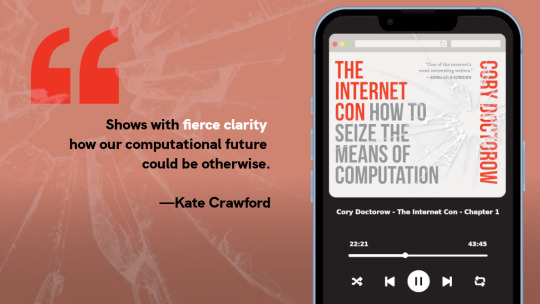
[Image ID: A brilliant barn burner of a book. Cory is one of the sharpest tech critics, and he shows with fierce clarity how our computational future could be otherwise -Kate Crawford, author of The Atlas of AI”]
The Internet Con isn’t just an analysis of where enshittification comes from: it’s a detailed, shovel-ready policy prescription for halting enshittification, throwing it into reverse and bringing back the old, good internet.
How do we do that? With interoperability: the ability to plug new technology into those crapulent, decaying platform. Interop lets you choose which parts of the service you want and block the parts you don’t (think of how an adblocker lets you take the take-it-or-leave “offer” from a website and reply with “How about nah?”):
https://www.eff.org/deeplinks/2019/07/adblocking-how-about-nah
But interop isn’t just about making platforms less terrible — it’s an explosive charge that demolishes walled gardens. With interop, you can leave a social media service, but keep talking to the people who stay. With interop, you can leave your mobile platform, but bring your apps and media with you to a rival’s service. With interop, you can break up with Amazon, and still keep your audiobooks.
So, if interop is so great, why isn’t it everywhere?
Well, it used to be. Interop is how Microsoft became the dominant operating system:
https://www.eff.org/deeplinks/2019/06/adversarial-interoperability-reviving-elegant-weapon-more-civilized-age-slay
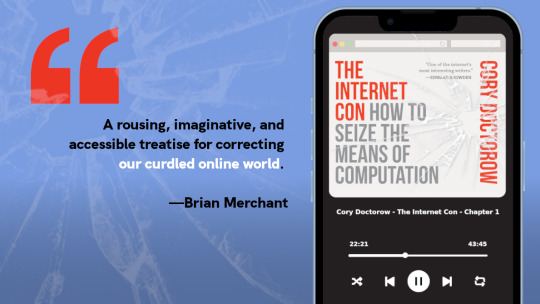
[Image ID: Nobody gets the internet-both the nuts and bolts that make it hum and the laws that shaped it into the mess it is-quite like Cory, and no one’s better qualified to deliver us a user manual for fixing it. That’s The Internet Con: a rousing, imaginative, and accessible treatise for correcting our curdled online world. If you care about the internet, get ready to dedicate yourself to making interoperability a reality. -Brian Merchant, author of Blood in the Machine]
It’s how Apple saved itself from Microsoft’s vicious campaign to destroy it:
https://www.eff.org/deeplinks/2019/06/adversarial-interoperability-reviving-elegant-weapon-more-civilized-age-slay
Every tech giant used interop to grow, and then every tech giant promptly turned around and attacked interoperators. Every pirate wants to be an admiral. When Big Tech did it, that was progress; when you do it back to Big Tech, that’s piracy. The tech giants used their monopoly power to make interop without permission illegal, creating a kind of “felony contempt of business model” (h/t Jay Freeman).
The Internet Con describes how this came to pass, but, more importantly, it tells us how to fix it. It lays out how we can combine different kinds of interop requirements (like the EU’s Digital Markets Act and Massachusetts’s Right to Repair law) with protections for reverse-engineering and other guerrilla tactics to create a system that is strong without being brittle, hard to cheat on and easy to enforce.
What’s more, this book explains how to get these policies: what existing legislative, regulatory and judicial powers can be invoked to make them a reality. Because we are living through the Great Enshittification, and crises erupt every ten seconds, and when those crises occur, the “good ideas lying around” can move from the fringes to the center in an eyeblink:
https://pluralistic.net/2023/06/12/only-a-crisis/#lets-gooooo

[Image ID: Thoughtfully written and patiently presented, The Internet Con explains how the promise of a free and open internet was lost to predatory business practices and the rush to commodify every aspect of our lives. An essential read for anyone that wants to understand how we lost control of our digital spaces and infrastructure to Silicon Valley’s tech giants, and how we can start fighting to get it back. -Tim Maughan, author of INFINITE DETAIL]
After all, we’ve known Big Tech was rotten for years, but we had no idea what to do about it. Every time a Big Tech colossus did something ghastly to millions or billions of people, we tried to fix the tech company. There’s no fixing the tech companies. They need to burn. The way to make users safe from Big Tech predators isn’t to make those predators behave better — it’s to evacuate those users:
https://pluralistic.net/2023/07/18/urban-wildlife-interface/#combustible-walled-gardens
I’ve been campaigning for human rights in the digital world for more than 20 years; I’ve been EFF’s European Director, representing the public interest at the EU, the UN, Westminster, Ottawa and DC. This is the subject I’ve devoted my life to, and I live my principles. I won’t let my books be sold with DRM, which means that Audible won’t carry my audiobooks. My agent tells me that this decision has cost me enough money to pay off my mortgage and put my kid through college. That’s a price I’m willing to pay if it means that my books aren’t enshittification bait.
But not selling on Audible has another cost, one that’s more important to me: a lot of readers prefer audiobooks and 9 out of 10 of those readers start and end their searches on Audible. When they don’t find an author there, they assume no audiobook exists, period. It got so bad I put up an audiobook on Amazon — me, reading an essay, explaining how Audible rips off writers and readers. It’s called “Why None of My Audiobooks Are For Sale on Audible”:
https://pluralistic.net/2022/07/25/can-you-hear-me-now/#acx-ripoff
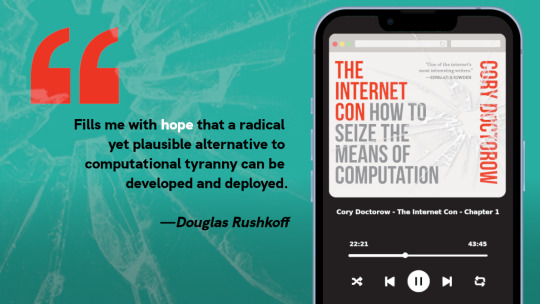
[Image ID: Doctorow has been thinking longer and smarter than anyone else I know about how we create and exchange value in a digital age. -Douglas Rushkoff, author of Present Shock]
To get my audiobooks into readers’ ears, I pre-sell them on Kickstarter. This has been wildly successful, both financially and as a means of getting other prominent authors to break up with Amazon and use crowdfunding to fill the gap. Writers like Brandon Sanderson are doing heroic work, smashing Amazon’s monopoly:
https://www.brandonsanderson.com/guest-editorial-cory-doctorow-is-a-bestselling-author-but-audible-wont-carry-his-audiobooks/
And to be frank, I love audiobooks, too. I swim every day as physio for a chronic pain condition, and I listen to 2–3 books/month on my underwater MP3 player, disappearing into an imaginary world as I scull back and forth in my public pool. I’m able to get those audiobooks on my MP3 player thanks to Libro.fm, a DRM-free store that supports indie booksellers all over the world:
https://blog.libro.fm/a-qa-with-mark-pearson-libro-fm-ceo-and-co-founder/
Producing my own audiobooks has been a dream. Working with Skyboat Media, I’ve gotten narrators like @wilwheaton, Amber Benson, @neil-gaiman and Stefan Rudnicki for my work:
https://craphound.com/shop/

[Image ID: “This book is the instruction manual Big Tech doesn’t want you to read. It deconstructs their crummy products, undemocratic business models, rigged legal regimes, and lies. Crack this book and help build something better. -Astra Taylor, author of Democracy May Not Exist, but We’ll Miss It When Its Gone”]
But for this title, I decided that I would read it myself. After all, I’ve been podcasting since 2006, reading my own work aloud every week or so, even as I traveled the world and gave thousands of speeches about the subject of this book. I was excited (and a little trepedatious) at the prospect, but how could I pass up a chance to work with director Gabrielle de Cuir, who has directed everyone from Anne Hathaway to LeVar Burton to Eric Idle?
Reader, I fucking nailed it. I went back to those daily recordings fully prepared to hate them, but they were good — even great (especially after my engineer John Taylor Williams mastered them). Listen for yourself!
https://archive.org/details/cory_doctorow_internet_con_chapter_01
I hope you’ll consider backing this Kickstarter. If you’ve ever read my free, open access, CC-licensed blog posts and novels, or listened to my podcasts, or come to one of my talks and wished there was a way to say thank you, this is it. These crowdfunders make my DRM-free publishing program viable, even as audiobooks grow more central to a writer’s income and even as a single company takes over nearly the entire audiobook market.
Backers can choose from the DRM-free audiobook, DRM-free ebook (EPUB and MOBI) and a hardcover — including a signed, personalized option, fulfilled through the great LA indie bookstore Book Soup:
https://www.kickstarter.com/projects/doctorow/the-internet-con-how-to-seize-the-means-of-computation
What’s more, these ebooks and audiobooks are unlike any you’ll get anywhere else because they are sold without any terms of service or license agreements. As has been the case since time immemorial, when you buy these books, they’re yours, and you are allowed to do anything with them that copyright law permits — give them away, lend them to friends, or simply read them with any technology you choose.
As with my previous Kickstarters, backers can get their audiobooks delivered with an app (from libro.fm) or as a folder of MP3s. That helps people who struggle with “sideloading,” a process that Apple and Google have made progressively harder, even as they force audiobook and ebook sellers to hand over a 30% app tax on every dollar they make:
https://www.kickstarter.com/projects/doctorow/red-team-blues-another-audiobook-that-amazon-wont-sell/posts/3788112
Enshittification is rotting every layer of the tech stack: mobile, payments, hosting, social, delivery, playback. Every tech company is pulling the rug out from under us, using the chokepoints they built between audiences and speakers, artists and fans, to pick all of our pockets.
The Internet Con isn’t just a lament for the internet we lost — it’s a plan to get it back. I hope you’ll get a copy and share it with the people you love, even as the tech platforms choke off your communities to pad their quarterly numbers.

Next weekend (Aug 4-6), I'll be in Austin for Armadillocon, a science fiction convention, where I'm the Guest of Honor:
https://armadillocon.org/d45/

If you'd like an essay-formatted version of this thread to read or share, here's a link to it on pluralistic.net, my surveillance-free, ad-free, tracker-free blog:
https://pluralistic.net/2023/07/31/seize-the-means-of-computation/#the-internet-con

[Image ID: My forthcoming book 'The Internet Con: How to Seize the Means of Computation' in various editions: Verso hardcover, audiobook displayed on a phone, and ebook displayed on an e-ink reader.]
#pluralistic#trustbusting#big tech#gift guide#kickstarter#the internet con#books#audiobooks#enshitiffication#disenshittification#crowdfunders#seize the means of computation#audible#amazon#verso
15K notes
·
View notes
Text
https://Audible.com/thirdeye
Download now! It’s funny! It has magic! And heart! And Fart jokes!
2K notes
·
View notes
Text
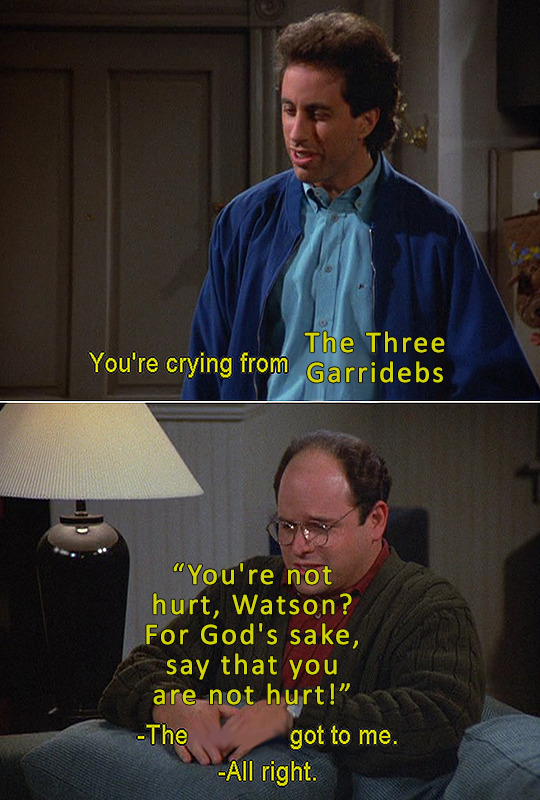
Listening to The Three Garridebs again!
375 notes
·
View notes
Text
REGARDING AUDIBLE
Brandon Sanderson: Hey, all. Brandon here, with what I consider to be some pretty exciting news. Many of you may remember when I wrote last year about my worries regarding audiobook royalties (particularly for independent authors). You can read it HERE, but some of the main bullet points are as follows:
I seriously worried about the opacity of reporting to authors about audio sales. We didn’t know what a sale meant, how much of an Audible credit was given to authors when a book sold via one, and how royalties were being accounted.
I felt that the industry was taking advantage of authors because of their lack of powerful corporate interests to advocate for them. While video game creators and musicians get 70–80% (88%, in fact, on two major platforms) of a sale of their products in a digital platform, Audible was paying as low as 25%–with the high end being instead 40%.
I felt I could have gotten a better deal for myself, but the entire state of this industry was seriously concerning to me. So, I made the difficult decision NOT to release the four Secret Projects on Audible, costing me a large number of sales, to instead try to bolster healthy competition in the space, highlighting some of the smaller Audible competitors.
I hoped this wake-up call would prompt change. I didn’t refuse to put my books on Audible out of retribution or to declare war; I did it because I wanted to shine as powerful a light as I knew how on a system that highly favored the audio distributors over the authors. I was convinced that the people at Audible really did love books and writers, and that with the right stand taken, I could encourage them toward positive change.
I’m happy to say that this stand has borne some fruit. I’ve spent this last year in contact with Audible and other audio distributors, and have pushed carefully–but forcefully–for them to step up. A few weeks ago, three key officers high in Audible’s structure flew to Dragonsteel offices and presented for us a new royalty structure they intend to offer to independent writers and smaller publishers.
This new structure doesn’t give everything I’ve wanted, and there is still work to do, but it is encouraging. They showed me new minimum royalty rates for authors–and they are, as per my suggestions, improved over the previous ones. Moreover, this structure will move to a system like I have requested: a system that pays more predictably on each credit spent, and that is more transparent for authors. Audible will be paying royalties monthly, instead of quarterly, and will provide a spreadsheet that better shows how they split up the money received with their authors.
This part looked really good to me, as I understand their decisions. I tried poking holes in the system, looking for ways it could be exploited, and found each issue I raised had already been considered. This doesn’t mean it’s going to be perfect, and people smarter than me might still find problems that I didn’t. However, I think everyone is going to agree the new system IS better. We will better be able to track, for example, how Audible is dividing money between books purchased with a credit and books listened to as part of their Audible Plus program.
It’s all very technical, but I have to say I’m impressed with the effort they have made. The people there listened to my complaints, and have tried to improve. I’m not at liberty to explain in its entirety their new structure right now, as they’re still tweaking it, but they did say I could announce its existence–and that I could promise new, improved royalties are on the horizon.
Now, before we go too far, I do anticipate a few continuing issues with the final product. I want to manage expectations by talking about those below.
What I’ve seen doesn’t yet bring us to the 70% royalty I think is fair, and which other, similar industries get.
Audible continues to reserve the best royalties for those authors who are exclusive to their platform, which I consider bad for consumers, as it stifles competition. In the new structure, both exclusive and non-exclusive authors will see an increase, but the gap is staying about the same.
Authors continue to have very little (basically no) control over pricing. Whatever the “cover price” of books is largely doesn’t matter–books actually sell for the price of a credit in an Audible subscription. Authors can never raise prices alongside inflation. An Audible credit costs the same as it did almost two decades ago–with no incentive for Audible to raise it, lest it lose customers to other services willing to loss-lead to draw customers over.
These are things I’d love to see change. However, this deal IS a step forward, and IS an attempt to meet me partway. Indeed, even incremental changes can mean a lot. When I was new in this business, my agent spent months arguing for a two-percent change in one of my print royalties–because every little bit helps. These improvements are going to be larger than two-percent increases.
Because of this, I will be bringing the Secret Projects to Audible very soon. I consider Audible to again be a positive force for the industry, and I have decided to shake hands with them. Audible has promised to release their new royalty system for all authors sometime in 2024, though I should be testing it in the next month or so.
And…if you’ll allow me a moment, I’d like to say that this feels good. It isn’t what I wanted, but I’d begun to think that nothing would ever change–that even my voice, loud though it can be, wouldn’t be enough. Yet change IS possible.
I know that there are plenty of people out there who are tired of hearing about me and my works (I’m sorry–I do have quite the group of evangelists, and we can be an enthusiastic lot). However, for better or for worse, I am one of the bestselling authors in the world. Historically, one of the best ways to change things in my industry is for authors like myself to force it to happen.
Feeling this responsibility, when I was first talking to Audible about these issues in 2022, I made it very clear that I wasn’t just seeking some quiet deal that gave me an individual advantage. I wanted to see positive change for all authors. And while I don’t think I can take sole credit, I do feel like my efforts this year have had a significantly positive effect. Soon every independent author who publishes on Audible (and maybe, eventually, traditionally published authors with the huge publishers–depending on what New York decides) will be getting a larger cut of the profit, with more transparency about how that cut is allocated.
So, for those who have been waiting until Audible had the Secret Projects, you’ll get your chance soon. I hope you’ll support them, and support Audible for their decisions. And thank you to all of you who shared the news about my problems with the audio industry last year; I believe that pressure really did help. This is a victory for all of us, because happier authors able to make a better living (particularly those authors who are struggling in the midlist trenches) make for a more vibrant world for everyone.
132 notes
·
View notes
Text
Soon is now. Sandman Act III is out on Audible.
2K notes
·
View notes
Note
Hi Diane, I was wondering if the audio books for your Young Wizard series would eventually be available for the Australian marketplace on Audible. I found some of your books on my regional Audible but sadly none of the Young Wizard books. 😢
I don’t think they will be, at least for the time being, as the YW publisher doesn’t hold any audio rights but those for North America (and the Philippines: one of those weird postcolonial things). Sorry not to be able to be of more help on this.
I’m making initial plans, though, for a read-by-the-author series, and those will be available internationally, as I’ll hold rights on those personally and will be able to publish them where I please. Investigations into the costs of studio time and other aspects of production are ongoing at the moment. I’ll post about it here when it starts to happen.
Anyway, thanks for asking!
119 notes
·
View notes
Text
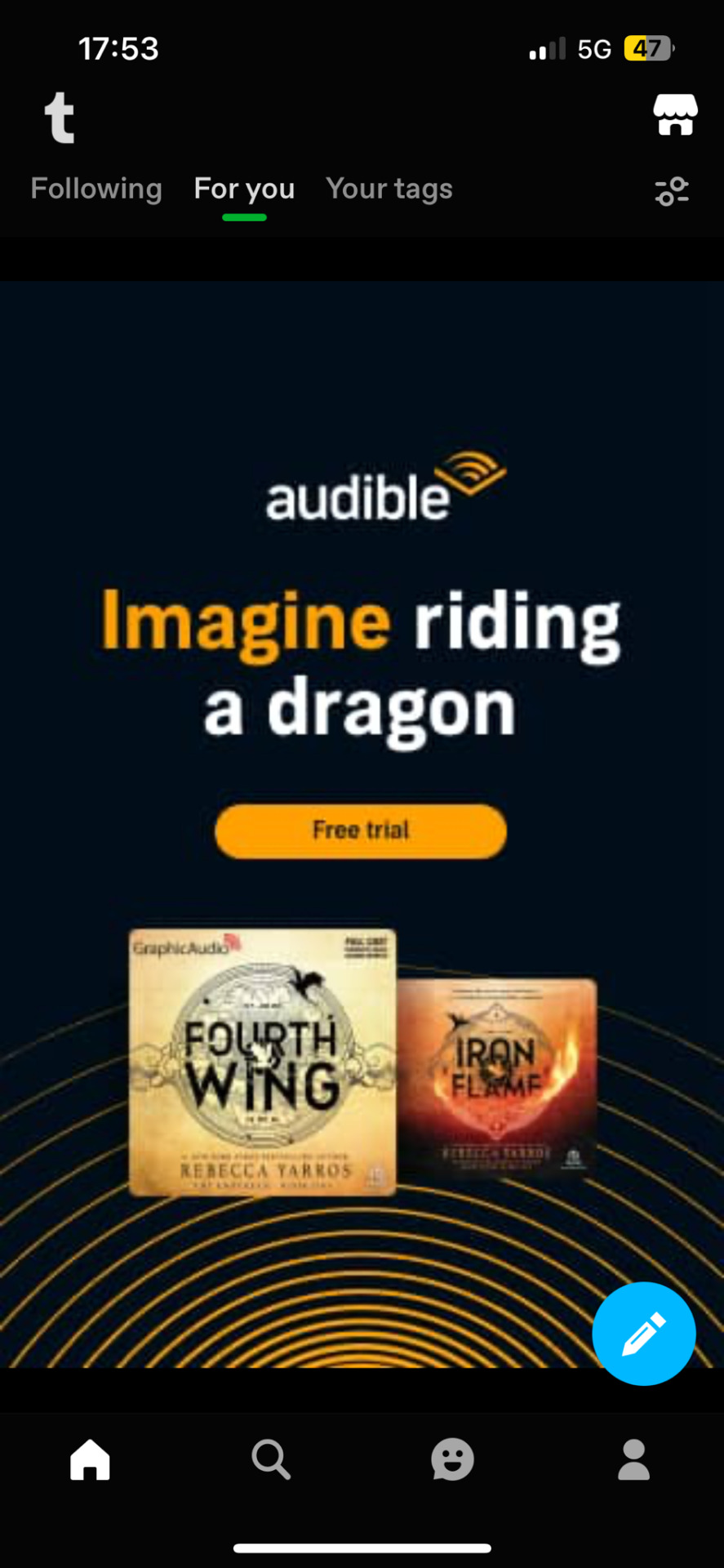
Audible, I’m not entirely sure this was the right ad for this website
144 notes
·
View notes
Text
MeMeS
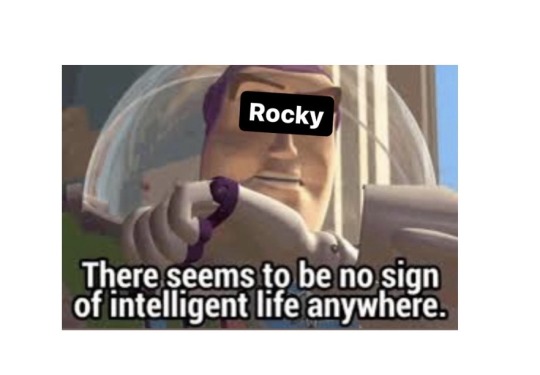

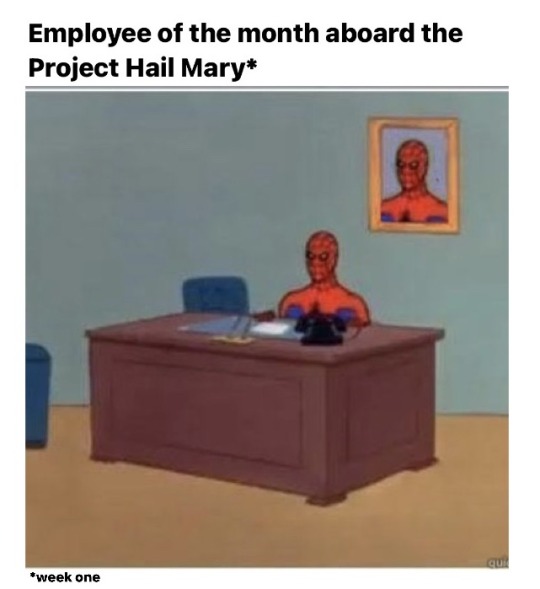
#project hail mary#meme#funny#andy weir#meirl#novel#books#booktok#book tumblr#rocky phm#rocky#astronaut#space#outer space#astrophage#quantum physics#science#scifi#audiobook#audible#spider#spider man meme#Toy Story meme#needs a sequel
133 notes
·
View notes
Text
apparently audible is giving 6 months of free membership to israelis bec of ... 'terrorism'?

at this rate, they should be giving a lifetime of free membership to palestinians lmaoo
#what#racism and islamophobia is so crazy lol bec aint nobody done even half of this for iraqis or afghans or yemenis or congolese or sudanese pp#like what even id the reasoning behind this were they just doing it for clout orrrr#audible#free palestine#palestine#gaza#long live palestine#glory to the martyrs#from the river to the sea palestine will be free#long live the resistance#death to israel
128 notes
·
View notes
Text
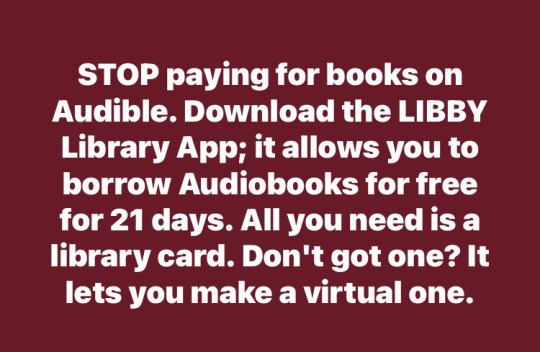
Fuck Amazon!
185 notes
·
View notes
Text
Not to dredge the Audible discourse up again, but I said I'd come back when I had more numbers, and this post is specifically aimed at the people still trying to claim in my inbox that 'Scribd pays authors better than Audible' and giving me shit for using Audible as an author.
So here we go. This is what I earn per 1 book via Audible purchase vs. Audible subscription:


Image ID: a screenshot from ACX, the Audible portal for authors. The text is broken up into boxes. Running from left to right, it reads Hunger Pangs: True Love Bites (Unabridged) by Joy Demorra. The sales region shown is the UK, and my royalty rate is Audible's standard of 25%. The number of units sold is 1. The amount the person paid is $25.59. My earnings from this sale is $6.40.
The following image is the same data but taken from Audible credits. The quality "sold" is 1, at a rate of $12.84, giving me a payment of $3.21. The next few numbers denote zero, showing no returns, making my earnings from Audible credit for this region $3.21. /End ID.
And this is what I earned from Scribd (sorry it's so small, I don't know if anyone will be able to read it):

Image ID: Another screenshot from the FindAwayVoices portal shows my royalty earnings from Scribd across three regions.
From top to bottom, it shows the number of sales for Hunger Pangs: True Love Bites, followed by a series of ID numbers. It also shows three individual sales from Sweden, Bulgaria, and the UK. The individuals have paid the equivalent of $19.99 in subscription fees. Out of that $19.99, Scribd pays me $1.21, and then FindawayVoices subtracts a further 0.24cents as a distribution fee leaving me with a total income of 0.97cents per book read. /End ID.
Now, I am aware that the Scribd subscription fee allows customers to listen to multiple things for the cost of their monthly fee without forcing them to return it the way Audible does. This means the author isn't subjected to negative income which is a good thing. And if that works for you, great. I'm happy for you. I am glad you have found a way to enjoy media that still pays authors something.
But can people who don't have a clue how the industry works please stop making unfounded claims that Scribd is 'better' and 'more ethical than Amazon' and 'actually pays authors' because, as you can see from the above, that's a crock of shit.
I'm not saying this to shame anyone. I'm not trying to guilt anyone for using Scribd services. Again, if it is something that works for you and you can afford it, great. Please keep using it. I would rather earn 97cents than nothing. But I am sick and tired of people who don't work the industry telling authors we have 'better options than Audible' then listing places like Scribd, seemingly operating on the belief that just because it isn't Amazon, it's inherently better.
My inbox is a nightmare of people telling me I deserve to have my work stolen for using Amazon at all, and I don't know how people can say things like that without realizing they're also the villain.
And just for the people saying it's illegal for Amazon to take refunds from the authors and leave us with negative income and we're all lying:

ID: another screenshot from ACX, the Audible portal for authors. The text is broken up into boxes. Running from left to right, it reads Hunger Pangs: True Love Bites (Unabridged) by Joy Demorra. The sales region shown is the UK, and my royalty rate is Audible's standard of 25%. There are no individual outright sales, but there is a negative credit indicating a return, with the subscription fee shown as -$13.31 (note: this is MORE than what Amazon charges for a sale ($12.84)) with a negative royalty rate of -$3.33 for the author, which is also 12 cents MORE than what we earn for a non-returned sale.
There is some debate over why this is, but the most prevalent idea at the moment is that this is Amazon factoring in the exchange rate, and making authors pay it. So not only are we paying for the return and making a negative income, but we're also paying the cost of the exchange rate. 🙃🙃🙃
And people are wondering why authors are screaming about booktok "hacks" that promote returning books even if you enjoyed them and begging people to use libraries instead. And just in case you want to see those figures:

Image ID: Another screenshot from the FindAwayVoices shows Library transaction details. The library paid $29.99 for the lending license, earning me a royalty fee of $13.50. FindAwayVoices took a further fee of $2.70 for distribution, making my total income from a single library transaction $10.80. /End ID.
With that single library transaction, I have earned more than what I made from 5 separate sales from both Amazon and Scribd combined. And I will continue to earn royalties from the library lending service. Not much. It will probably be about a dollar max depending on the country and exchange rate. BUT--that's a dollar I am making that YOU don't have to pay for. This is why library lending services are so essential and why authors are begging readers/listeners to use services like OverDrive and Libby instead of abusing Amazon return policies.
Libraries pay us. And the more people request our books and check them out, the more likely they will be to keep buying our stuff and keep us in their catalog.
So please, please, please, support your local libraries and also stop harassing creators for using multiple platforms to sell our work. Most of us are making a pittance from our work. We don't need people who don't understand how rigged the system is against us lecturing us about how it's our fault because of where we are forced to sell just to try and make a living. 😔
Anyway, support authors direct where you can. Support your local libraries. Stop being a dick to creators, etc.
I'm going to go scream into a pillow for a bit then get back to work.
Edit: sorry for the weird formatting. I have no idea how that happened. I couldn't see the excess text until it posted.
#long post#described#audible#scribd#indie author#indie publishing#publishing#sales figures#royalties#the reality of publishing#there is no ethical consumption under late stage capitalism#this is the bad place
2K notes
·
View notes
Text
Kickstarting the audiobook of The Lost Cause, my novel of environmental hope
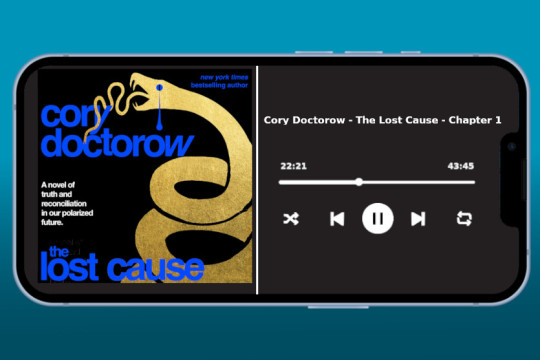
Tonight (October 2), I'm in Boise to host an event with VE Schwab. On October 7–8, I'm in Milan to keynote Wired Nextfest.

The Lost Cause is my next novel. It's about the climate emergency. It's hopeful. Library Journal called it "a message hope in a near-future that looks increasingly bleak." As with every other one of my books Amazon refuses to sell the audiobook, so I made my own, and I'm pre-selling it on Kickstarter:
https://www.kickstarter.com/projects/doctorow/the-lost-cause-a-novel-of-climate-and-hope
That's a lot to unpack, I know. So many questions! Including this one: "How is it that I have another book out in 2023?" Because this is my third book this year. Short answer: I write when I'm anxious, so I came out of lockdown with nine books. Nine!
Hope and writing are closely related activities. Hope (the belief that you can make things better) is nothing so cheap and fatalistic as optimism (the belief that things will improve no matter what you do). The Lost Cause is full of people who are full of hope.
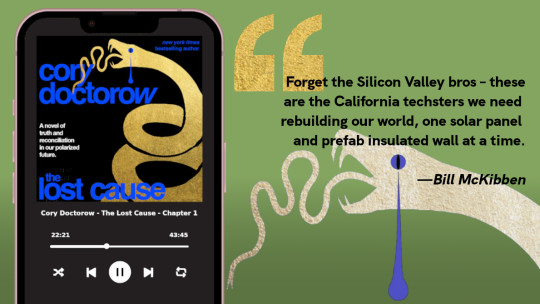
The action begins a full generation after the Hail Mary passage of the Green New Deal, and the people who grew up fighting the climate emergency (rather than sitting hopelessly by while the powers that be insisted that nothing could or should be done) have a name for themselves: they call themselves "the first generation in a century that doesn't fear the future."
I fear the future. Unchecked corporate power has us barreling over a cliff's edge and all the one-percent has to say is, "Well, it's too late to swerve now, what if the bus rolls and someone breaks a leg? Don't worry, we'll just keep speeding up and leap the gorge":
https://locusmag.com/2022/07/cory-doctorow-the-swerve/
That unchecked corporate power has no better avatar than Amazon, one of the tech monopolies that has converted the old, good internet into "five giant websites, each filled with screenshots of the other four":
https://twitter.com/tveastman/status/1069674780826071040
Amazon maintains a near-total grip over print and ebooks, but when it comes to audiobooks, that control is total. The company's Audible division has captured more than 90% of the market, and it abuses that dominance to cram Digital Rights Management onto every book it sells, even if the author doesn't want it:
https://pluralistic.net/2022/07/25/can-you-hear-me-now/#acx-ripoff
I wrote a whole-ass book about this and it came out less than a month ago; it's called The Internet Con and it lays out an audacious plan to halt the internet's enshittification and throw it into reverse:
http://www.seizethemeansofcomputation.org/
The tldr is this: when an audiobook is wrapped in Amazon's DRM, only Amazon can legally remove it. That means that every book I sell you on Audible is a book you have to throw away if you ever break up with Amazon, and Amazon can use the fact that it's hold you hostage to screw me – and every other author – over.
As I said last time this came up:
Fuck that sideways.
With a brick.

My books are sold without DRM, so you can play them in any app and do anything copyright permits, and that means Amazon won't carry them, and that means my publishers don't want to pay to produce them, and that means I produce them myself, and then I make the (significant) costs back by selling them on Kickstarter.
And you know what? It works. Readers don't want DRM. I mean, duh. No one woke up this morning and said, "Dammit, why won't someone sell me a product that lets me do less with my books?" I sell boatloads" of books through these crowdfunding campaigns. I sold so many copies of my last book, *The Internet Con, that they sold out the initial print run in two weeks (don't worry, they held back stock for my upcoming events).
But beyond that, I think there's another reason my readers keep coming back, even though I wrote a genuinely stupid number of books while working through lockdown anxiety while the wildfires raged and ashes sifted down out of the sky and settled on my laptop as I lay in my backyard hammock, pounding my keyboard.
(I went through two keyboards during lockdown. Thankfully, I bought a user-serviceable laptop from Framework and fixed it myself both times, in a matter of minutes. No, no one pays me to mention this, but hot damn is it cool.)
https://pluralistic.net/2022/11/13/graceful-failure/#frame
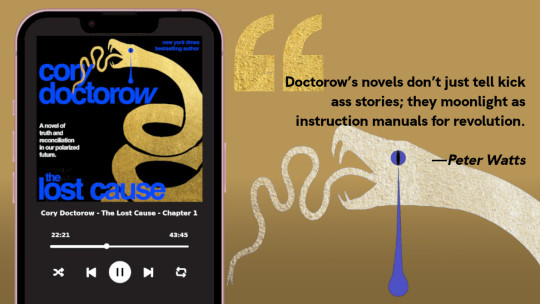
The reason readers come back to my books is that they're full of hope. In the same way that writing lets me feel like I'm not a passenger in life, but rather, someone with a say in my destination, the books that I write are full of practical ways and dramatic scenes in which other people seize the means of computation, the reins of power or their own destinies.
The protagonist of The Lost Cause is Brooks Palazzo, a high-school senior in Burbank whose parents were part of the original cohort of volunteers who kicked off the global transformation, and left him an orphan when they succumbed to one of the zoonotic plagues that arise every time another habitat is destroyed.
Brooks grew up knowing what his life would be: the work of repair and care, which millions of young people are doing. Relocating entire cities off endangered coastlines and floodplains, or out of fire-zones. Fighting floods and fires. Caring for tens of millions of refugees for whom the change came too late.
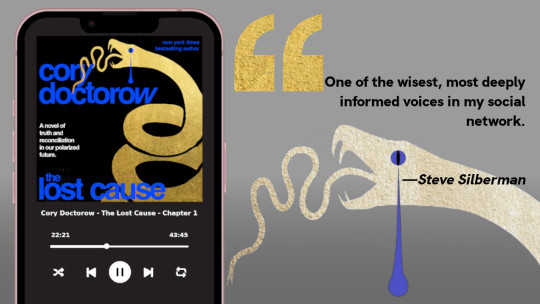
But with every revolution comes a counter-revolution. The losers of a just war don't dig holes, climb inside and pull the dirt down on top of themselves. Two groups of reactionaries – seagoing anarcho-capitalist billionaire wreckers and seething white nationalist militias – have formed an alliance.
They've already gotten their champion into the White House. Next up: dismantling every cause for hope Brooks and his friends have, and bringing back the fear.
That's the setup for a novel about solidarity, care, library socialism, and snatching victory from defeat's jaws. Writing it help keep me sane during the lockdown, and when it came time to record the audiobook, I spent a lot of time thinking about who could read it. I've had some great narrators: Wil Wheaton, @neil-gaiman, Amber Benson, Bronson Pinchot, and more.
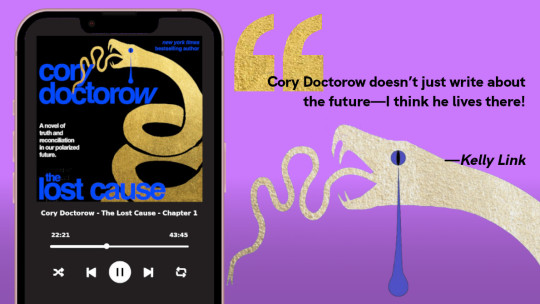
I record my audiobooks with Skyboat Media, a brilliant studio near my place in LA. Back in August, I spent a week in their recording booth – "The Tardis" – doing something I'd never tried before: I recorded a whole audiobook, with directorial supervision: The Internet Con:
https://transactions.sendowl.com/products/78992826/DEA0CE12/purchase
When it was done, the director – audiobook legend Gabrielle de Cuir – sat me down and said, "Look, I've never said this to an author before, but I think you should read The Lost Cause. I don't direct anyone anymore except for Wil Wheaton and LeVar Burton, but I would direct you on this one."
I was immensely flattered – and very nervous. Reading The Internet Con was one thing – the book is built around the speeches I've been giving for 20 years and I knew I could sell those lines – but The Lost Cause is a novel, with a whole cast of characters. Could I do it?
Reader, I did it. I just listened to the proofs last week and:
It.
Came.
Out.
Great.
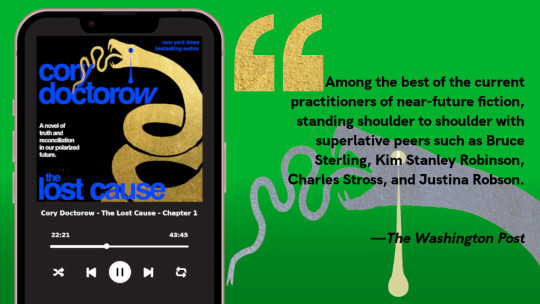
The Lost Cause goes on sale on November 14th, and I'll be selling this audiobook I made everywhere audiobooks are sold – except for the stores that require DRM, nonconsensually shackling readers and writers to their platforms. So you'll be able to get it on Libro.fm, downpour.com, even Google Play – but not Audible, Apple Books, or Audiobooks.com.
But in addition to those worthy retailers, I will be sending out thousands – and thousands! – of audiobook to my Kickstarter backers on the on-sale date, either as a folder of DRM-free MP3s, or as a download code for Libro.fm, to make things easy for people who don't want to have to figure out how to sideload an audiobook into a standalone app.
And, of course, the mobile duopoly have made this kind of sideloading exponentially harder over the past decade, though far be it from me to connect this with their policy of charging 30% commissions on everything sold through an app, a commission they don't receive if you get your files on the web and load 'em yourself:
https://www.kickstarter.com/projects/doctorow/red-team-blues-another-audiobook-that-amazon-wont-sell/posts/3788112
As with my previous Kickstarters, I'm also selling ebooks and hardcovers – signed or unsigned, and this time I've found a great partner to fulfill EU orders from within the EU, so backers won't have to pay VAT and customs charges. The wonderful Otherland – who have hosted me on my last two trips to Berlin – are going to manage that shipping for me:
https://www.otherland-berlin.de/en/home.html
Kim Stanley Robinson read the book and said, "Along with the rush of adrenaline I felt a solid surge of hope. May it go like this." That's just about the perfect quote, because the book is a ride. It's not just a kumbaya tale of a better world that is possible: it's a post-cyberpunk novel of high-tech guerrilla and meme warfare, climate tech and bad climate tech, wildcat prefab urban infill, and far-right militamen who adapt to a ban on assault-rifles by switching to super-soakers full of hydrochloric acid.
It's a book about struggle, hope in the darkness, and a way through this rotten moment. It's a book that dares to imagine that things might get worse but also better. This is a curious emotional melange, but it's one that I'm increasingly feeling these days.
Like, Amazon, that giant bully, whose blockade on DRM-free audiobooks cost me enough money to pay off my mortgage and put my kid through university (according to my agent)? The incredible Lina Khan brought a long-overdue antitrust case against Amazon while her rockstar DoJ counterpart, Jonathan Kanter, is dragging Google through the courts.
The EU is taking on Apple, and French cops are kicking down Nvidia's doors and grabbing their files, looking to build another antitrust case for monopolizing GPUs. The writers won their strike and Joe Biden walked the picket-line with the UAW, the first president in history to join striking workers:
https://doctorow.medium.com/joe-biden-is-headed-to-a-uaw-picket-line-in-detroit-f80bd0b372ab?sk=f3abdfd3f26d2f615ad9d2f1839bcc07

Solar is now our cheapest energy source, which is wild, because if we could only capture 0.4% of the solar energy that makes it through the atmosphere, we could give everyone alive the same energy budget as Canadians (who have American lifestyles but higher heating bills). As Deb Chachra writes in her forthcoming How Infrastructure Works (my review pending): we get a fresh supply of energy every time the sun rises and we only get new materials when a comet survives atmospheric entry, but we treat energy as scarce and throw away our materials after a single use:
https://www.penguinrandomhouse.com/books/612711/how-infrastructure-works-by-deb-chachra/
Anything that can't go on forever will eventually stop. We have shot past many of our planetary boundaries and there are waves of climate crises in our future, but they don't have to be climate disasters. That's up to us – it'll depend on whether we come together to save ourselves and each other, or tear ourselves apart.
The Lost Cause dares to imagine what it might be like if we do the former. We don't live in a post-enshittification world yet, but we could. With these indie audiobooks, I've found a way to treat the terminal enshittification of the Amazon monopoly as damage and route around it. I hope you'll back the Kickstarter, fight enshittification, inject some hope into your reading, and enjoy a kickass adventure novel in the process:
https://www.kickstarter.com/projects/doctorow/the-lost-cause-a-novel-of-climate-and-hope

If you'd like an essay-formatted version of this post to read or share, here's a link to it on pluralistic.net, my surveillance-free, ad-free, tracker-free blog:
https://pluralistic.net/2023/10/02/the-lost-cause/#the-first-generation-that-doesnt-fear-the-future
#pluralistic#audiobooks#the lost cause#crowdfunding#kickstarter#spoken word#climate#climate emergency#monopoly#drm#amazon#audible#skyboat#science fiction#hope not optimism
2K notes
·
View notes
Text
youtube


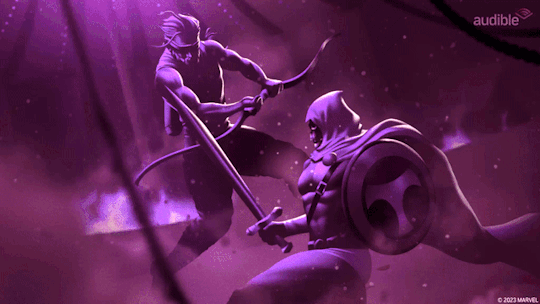
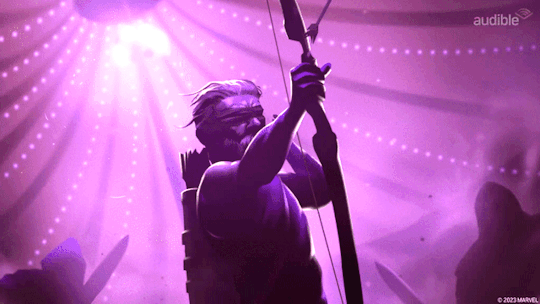
HAWKEYE - Wastelanders (Podcast)
Marvel’s Wastelanders: Hawkeye
International Edition on Audible
in French, German, Hindi, Italian and Japanese
Sept 29, 2023
#Hawkeye#Clint Barton#Olivier Marchal#Ash Barton#Assa Sylla#Kate Bishop#Zemo#Wastelanders#Old Man Hawkeye#Marvel Podcast#Audible#Youtube
107 notes
·
View notes
Text
i may be aroace, but i would definitely marry lister bird (i love him)
#lister bird#i was born for this#i love him#aromantic#aroace#asexual#lgbtqia#queer#alice oseman#ya novels#osemanverse#lgbtq#audible#i was born for this audiobook#jimmy kaga ricci#rowan omondi#bliss lai#juliet schwartz#angel rahimi#bicci
60 notes
·
View notes
Text

BOYCOTT AUDIBLE + THEY ARE OWN BY AMAZON WHICH IS ON THE OFFICIAL BDS BOYCOTT LIST.
GET YOUR AUDIOBOOKS FROM YOUR LOCAL LIBRARY AND/OR OTHER WEBSITE
#free Palestine#boycott#boycott israel#audible#amazon#boycott amazon#I have reblog so many free book website I wish I could have tag them…#oh well- there are many places you can get a free book but If you can Get a library card from your local library
51 notes
·
View notes


